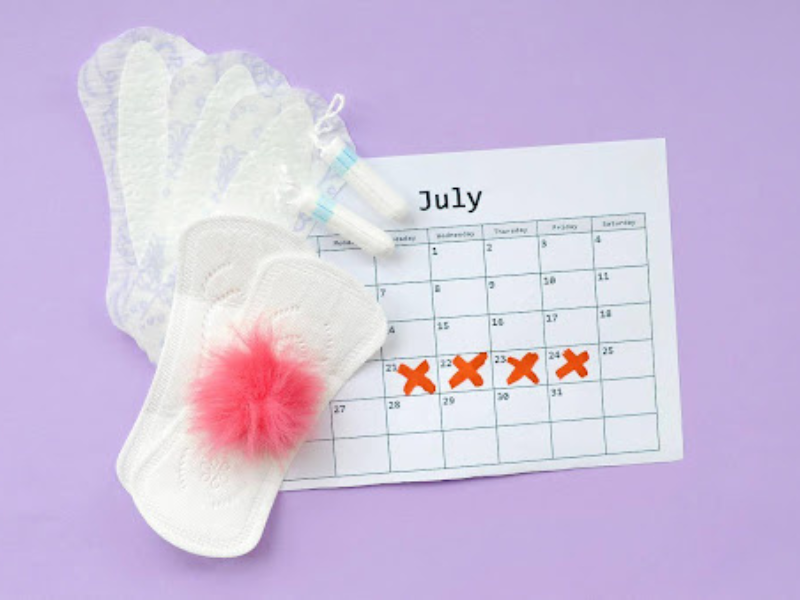
A Guide to Understanding Menopause and Irregular Periods
Menopause is a natural process that marks the end of a female’s reproductive years, and one of the most common symptoms of forthcoming menopause is irregular intervals. These instabilities in menstrual cycles can become a matter of concern, however this is very normal during this phase.
This article discovers the connection between irregular periods menopause, what causes irregular periods due to menopause, how irregular menstrual periods and menopause are linked, and when irregular intervals and early menopause might arise.
What Causes Irregular Periods during Menopause?
Irregular periods during menopause are one of the key symptoms of the perimenopause phase, which can start years before actual menopause takes place. As a female gradually reaches the menopausal phase, her hormone levels – especially estrogen and progesterone – start to imbalance.
This hormonal imbalance is the elementary reason for irregular periods of menopause, leading to transformations in the length and frequency of menstrual cycles.
The body starts to ovulate irregularly, implying that the release of the eggs becomes less predictable, and periods may become shorter, longer, heavier, or lighter.
These variations can cause irregular periods due to menopause an irritating experience. For women, the volatility is difficult, however, understanding it’s a normal part of the transition can help ease your worries.
Irregular Periods and Early Menopause: What’s the Connection?
Some females experience irregular periods and early menopause, which implies that their periods become either irregular or come to an end completely before reaching the age of 45.
Early menopause can be caused by different factors, such as genetics, certain medical circumstances, or even because of lifestyle choices which include smoking. For those who experience irregular intervals and early menopause, it’s crucial to seek advice from a healthcare professional to determine if early menopause is certainly the cause.
Women who have reached their late 30s or early 40s may notice irregular menstrual periods and menopause symptoms even before they are expected to happen.
This can consist of missed periods, spotting, or periods that fluctuate from what has been their norm. Irregular periods due to menopause also can imply the initial phases of perimenopause, even in younger women.
How Irregular Menstrual Periods and Menopause are Connected?
The relationship between irregular menstrual periods and menopause lies inside the body’s changing hormonal panorama. As estrogen levels tend to fluctuate, so does the menstrual cycle.
For women going through perimenopause, it’s common to have months where they might miss their periods altogether, only to have a heavy, prolonged one the upcoming month. This inconsistency in menstrual flow is a trademark of irregular periods menopause.
Moreover, many women experience spotting between their periods or heavier bleeding at this stage, gradually increasing concerns about fitness and health.
While irregular bleeding may be alarming, it is one of the signs of irregular periods due to menopause. However, if the bleeding is excessively heavy or followed by excessive pain, it’s crucial to take clinical recommendations to rule out any other conditions.
The Emotional Impact of Irregular Periods Menopause
Managing irregular periods menopause may be emotionally challenging for many ladies. The uncertainty of when will next period arrive, how long it will last, and how heavy it is going to be can cause strain and tension. These symptoms are not just bodily; they also can affect a female’s mental well-being.
The unpredictability of irregular periods during menopause can lead to feelings of frustration and lack of control over one’s body. Coupled with various other menopausal signs including hot flashes, mood swings, and fatigue, the emotional toll can become overwhelming.
Comprehending irregular menstrual periods and menopause are normal can help ease these feelings and prepare all females for this transitional stage.
Lifestyle Changes to Manage Irregular Periods Due to Menopause
Even though irregular periods due to menopause are inevitable, certain lifestyle adjustments can help control the signs. Having a healthful plan, staying physically energetic, and reducing stress are effective techniques to help cope with irregular periods menopause.
Since hormonal variations are at the root of the issue, balancing such hormonal imbalance is possible through proper diet regime and exercise can also help stabilize the menstrual cycle.
Foods that are rich in phytoestrogens, are soy products, flaxseeds, and a few fruits, consuming such foods can help alleviate signs of irregular periods during menopause.
Exercising, particularly yoga and cardio activities, has additionally been shown to stabilize hormones and reduce the frequency of irregular periods.
Hormone Therapy for Irregular Menstrual Periods and Menopause
For women struggling with certain symptoms of irregular menstrual periods and menopause, hormone therapy (HT) can be an option for you. Hormone therapy can regulate the body’s estrogen levels, which in turn can calm the menstrual cycle and reduce the severity of irregular periods menopause.
HT comes in distinctive forms, consisting of pills, patches, and creams. It’s critical to talk to a healthcare professional to decide whether HT is suitable for you or not because it’s not suitable for all women, especially people who have a history of certain cancers or cardiovascular problems.
It can also turn out to be a powerful remedy for curing irregular periods due to menopause. There is the probability of having risk associated with it if used for a longer time, so it must be cautiously considered.
When Do You Need to Worry About Irregular Periods and Early Menopause?
Irregular periods due to menopause are not unusual, there are times when it’s necessary to seek medical advice. Women experiencing irregular periods and early menopause need to consult a healthcare professional if their periods stop before the age of 45 without an apparent purpose, as this can indicate early menopause or different underlying health conditions.
Moreover, if irregular periods during menopause are followed by unusually heavy bleeding, large blood clots, or severe aches, these indicate the signs of a greater and severe difficulty consisting of fibroids, endometriosis, or even precancerous conditions.
Even though these conditions can coexist with irregular menstrual periods and menopause, so it’s critical to supervise these signs and symptoms and seek appropriate care.
Natural Remedies for Irregular Periods Menopause
Many women choose natural treatments to manage irregular periods menopause instead of hormone therapy (HT). Herbal supplements such as black cohosh, red clover, and evening primrose oil have been proven to alleviate the signs of irregular periods due to menopause.
These dietary supplements help to bring back hormonal stability and lower the severity of hot flashes, mood swings, and irregular periods.
Moreover, acupuncture and mindfulness-based stress reduction (MBSR) techniques are alternative therapies that have shown proven evidence of enhancing the symptoms of irregular menstrual periods and menopause.
All these treatments might not completely prevent the irregularity, but they could reduce its frequency and intensity, making the transition through menopause smoother.
The Role of Stress in Irregular Periods and Early Menopause
Stress is a very critical factor that might exacerbate irregular periods during menopause. Chronic stress can make the body release a higher level of cortisol which can similarly disrupt hormonal stability and worsen irregular periods menopause.
High levels of anxiety and stress can become the cause of early menopause in some cases, contributing to irregular periods and early menopause. Prioritizing intellectual health is vital for preserving a balanced hormonal device and minimizing abnormal intervals because of menopause.
Know How to Cope with Irregular Periods during Menopause
Finally, the key to handling irregular periods during menopause is education and coaching. Women who understand the method of irregular periods of menopause can navigate better the transitions in their bodies.
Keeping a regular track of their menstrual cycles, noting the changes in frequency, flow, and duration, is also important to be mindful of the other signs and symptoms as it will allow you to expect and manage irregular periods due to menopause.
Key Takeaways
In conclusion, menopause and irregular periods are highly linked due to hormonal shifts that cause irregular ovulation and transitions in menstrual cycles.
Whether you are going through irregular periods and early menopause or coping with irregular periods during menopause later in life, it’s critical to remember the fact that changes are nothing abnormal.
Yet, it is important to stay informed, handle your symptoms, and incorporate certain changes in your lifestyle.
Citations
- https://www.who.int/news-room/fact-sheets/detail/menopause
- https://pmc.ncbi.nlm.nih.gov/articles/PMC3232023/
- https://www.theguardian.com/society/2021/jul/22/there-will-be-blood-women-on-the-shocking-truth-about-periods-and-perimenopause
- https://www.medicalnewstoday.com/articles/155651
- https://www.breastcancer.org/treatment-side-effects/menopause/irregular-periods
- https://www.bbc.com/news/health-48258910

Prativa Chatterjee







